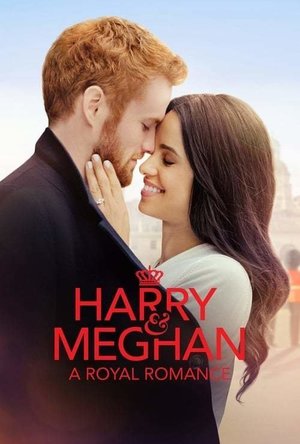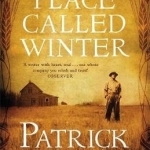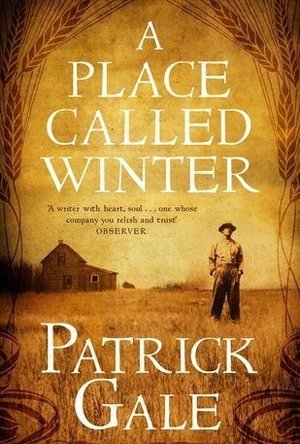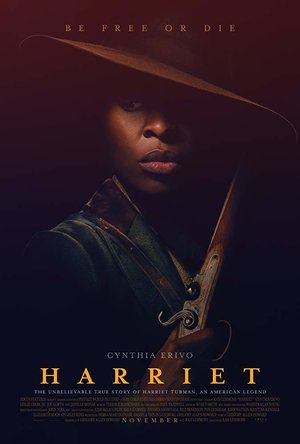Search

Harry & Meghan: A Royal Romance
TV Show
American TV movie retelling of the fairytale romance between a troubled ginger army veteran and a TV...
based on true events (really really loosely)
Hazel (1853 KP) rated A Place Called Winter in Books
May 28, 2017
Loosely based on truth
This eBook was provided by the publisher via NetGalley in exchange for an honest review
Loosely based upon a true story, one of Patrick Gale’s ancestors in fact, A Place Called Winter follows the life of Harry Cane during the early 1900s. The book begins with Harry being transferred from a mental asylum to a therapeutic community called Bethel Ranch. The story then backtracks to Harry’s life as a young, nervous, motherless boy and the time he met his future wife, Winnie.
Throughout the book the reader is trying to guess the reason Harry eventually finds himself at Bethel Ranch. Gale describes Harry’s marriage, his discovery of homosexuality and his move to Canada to his final stop at a homestead in a place called Winter. Does Harry develop a mental illness or is it something to do with his scandalous desires? Or, does something else happen later in the book?
After moving to Canada, Harry does not exactly have it easy and the reader feels for him as he perseveres with his new life style. We watch him grow from a timid young man into someone with his own farm and independence. It makes it all the more upsetting to read when certain things take a turn for the worse.
In this historical novel, Patrick Gale emphasizes on the way homosexuality was regarded in society. Entire families cut people out of their lives at the slightest hint of a scandal. Gale also touches on the techniques used within mental asylums during this period as well as racial discrimination.
Occasionally, the story was difficult to read as it alternated between being really interesting and then slightly dull. Overall, regardless of how much was based on actual events, it was a good storyline, and once you have started reading you feel the need to continue to find out what happens to Harry. I have only read one other book by Patrick Gale – Notes From an Exhibition – that I struggled with a little. A Place Called Winter, however, was a lot better than I was expecting.
Loosely based upon a true story, one of Patrick Gale’s ancestors in fact, A Place Called Winter follows the life of Harry Cane during the early 1900s. The book begins with Harry being transferred from a mental asylum to a therapeutic community called Bethel Ranch. The story then backtracks to Harry’s life as a young, nervous, motherless boy and the time he met his future wife, Winnie.
Throughout the book the reader is trying to guess the reason Harry eventually finds himself at Bethel Ranch. Gale describes Harry’s marriage, his discovery of homosexuality and his move to Canada to his final stop at a homestead in a place called Winter. Does Harry develop a mental illness or is it something to do with his scandalous desires? Or, does something else happen later in the book?
After moving to Canada, Harry does not exactly have it easy and the reader feels for him as he perseveres with his new life style. We watch him grow from a timid young man into someone with his own farm and independence. It makes it all the more upsetting to read when certain things take a turn for the worse.
In this historical novel, Patrick Gale emphasizes on the way homosexuality was regarded in society. Entire families cut people out of their lives at the slightest hint of a scandal. Gale also touches on the techniques used within mental asylums during this period as well as racial discrimination.
Occasionally, the story was difficult to read as it alternated between being really interesting and then slightly dull. Overall, regardless of how much was based on actual events, it was a good storyline, and once you have started reading you feel the need to continue to find out what happens to Harry. I have only read one other book by Patrick Gale – Notes From an Exhibition – that I struggled with a little. A Place Called Winter, however, was a lot better than I was expecting.
Hazel (1853 KP) rated A Place Called Winter in Books
Dec 17, 2018
<i>This eBook was provided by the publisher via NetGalley in exchange for an honest review</i>
Loosely based upon a true story, one of Patrick Gale’s ancestors in fact, <i>A Place Called Winter</i> follows the life of Harry Cane during the early 1900s. The book begins with Harry being transferred from a mental asylum to a therapeutic community called Bethel Ranch. The story then backtracks to Harry’s life as a young, nervous, motherless boy and the time he met his future wife, Winnie.
Throughout the book the reader is trying to guess the reason Harry eventually finds himself at Bethel Ranch. Gale describes Harry’s marriage, his discovery of homosexuality and his move to Canada to his final stop at a homestead in a place called Winter. Does Harry develop a mental illness or is it something to do with his scandalous desires? Or, does something else happen later in the book?
After moving to Canada, Harry does not exactly have it easy and the reader feels for him as he perseveres with his new life style. We watch him grow from a timid young man into someone with his own farm and independence. It makes it all the more upsetting to read when certain things take a turn for the worse.
In this historical novel, Patrick Gale emphasizes on the way homosexuality was regarded in society. Entire families cut people out of their lives at the slightest hint of a scandal. Gale also touches on the techniques used within mental asylums during this period as well as racial discrimination.
Occasionally, the story was difficult to read as it alternated between being really interesting and then slightly dull. Overall, regardless of how much was based on actual events, it was a good storyline, and once you have started reading you feel the need to continue to find out what happens to Harry. I have only read one other book by Patrick Gale –<i> Notes From an Exhibition</i> – that I struggled with a little. <i>A Place Called Winter, however, was a lot better than I was expecting. </i>
Loosely based upon a true story, one of Patrick Gale’s ancestors in fact, <i>A Place Called Winter</i> follows the life of Harry Cane during the early 1900s. The book begins with Harry being transferred from a mental asylum to a therapeutic community called Bethel Ranch. The story then backtracks to Harry’s life as a young, nervous, motherless boy and the time he met his future wife, Winnie.
Throughout the book the reader is trying to guess the reason Harry eventually finds himself at Bethel Ranch. Gale describes Harry’s marriage, his discovery of homosexuality and his move to Canada to his final stop at a homestead in a place called Winter. Does Harry develop a mental illness or is it something to do with his scandalous desires? Or, does something else happen later in the book?
After moving to Canada, Harry does not exactly have it easy and the reader feels for him as he perseveres with his new life style. We watch him grow from a timid young man into someone with his own farm and independence. It makes it all the more upsetting to read when certain things take a turn for the worse.
In this historical novel, Patrick Gale emphasizes on the way homosexuality was regarded in society. Entire families cut people out of their lives at the slightest hint of a scandal. Gale also touches on the techniques used within mental asylums during this period as well as racial discrimination.
Occasionally, the story was difficult to read as it alternated between being really interesting and then slightly dull. Overall, regardless of how much was based on actual events, it was a good storyline, and once you have started reading you feel the need to continue to find out what happens to Harry. I have only read one other book by Patrick Gale –<i> Notes From an Exhibition</i> – that I struggled with a little. <i>A Place Called Winter, however, was a lot better than I was expecting. </i>
Sarah (7800 KP) rated It’s A Sin in TV
Feb 7, 2021
Outstanding drama
It’s A Sin is the latest drama from the mind of Russell T Davies, the man behind Queer as Folk, Cucumber and the revival of Doctor Who back in 2005. It follows a group of gay men and their friends in London from 1981 to 1991, depicting how the developing HIV and AIDS crisis impacted on their lives.
The series concentrates on 5 friends who meet in 1981 and move into a flat together. There’s outgoing and smart Ritchie (Olly Alexander), shy and mild mannered Colin (Callum Scott Howells), flamboyant Nigerian Roscoe (Omari Douglas), sweet Ash (Nathaniel Curtis) and outgoing, responsible Jill (Lydia West). It’s A Sin follows the friends as they party and lead promiscuous lifestyles over the 80s, only for the AIDS crisis to slowly weave its way into their lives and affect friends and colleagues closest to them. Each deals with the developing crisis in their own way: Jill fights for AIDS awareness and help for those that are suffering, whereas Ritchie remains in denial and spreads conspiracy theories about AIDS. But by 1991, the lives of the group and their families have been irrevocably changed.
It’s A Sin is a powerful drama about an emotive and serious subject. While it is not based on a completely true story (only Jill is loosely based on a real person, Jill Nalder, a friend of Davies), Russell T Davies has based this around his and his friends experiences of the AIDS crisis in the 80s and watching this you can really believe that these sorts of events happened across the 80s and 90s. The attitudes and experiences shown here, from the hedonistic lifestyles to the rampant denial and conspiracy theories, are terrifying and sadly a true to life depiction of the attitudes at the time, and make for a rather emotional and sometimes harrowing watch.
Despite the serious subject, It’s A Sin isn’t entirely sombre. It starts out as a story of friendship and fun and there are a lot of heartwarming scenes and a surprising amount of laughs. Some might think the uplifting side of this drama detracts from the seriousness of the AIDS crisis, but personally I found the lighthearted scenes helped balance the rather sobering seriousness, especially as the episodes gradually become more and more grave as the crisis progresses. Even the gay sex scenes are fun and made mostly for laughs rather than any sort of eroticism. It’s impressive that Davies has managed to pull off a series that seamlessly blends lighthearted entertainment with a serious topic, without making light of such a harrowing crisis.
It helps that the cast are fantastic. Olly Alexander, who I knew nothing about other than recognising a few Years and Years songs, is an absolute star and a standout as Ritchie. He’s charismatic and engaging and when he’s on screen, you can’t take your eyes off him. The rest of the main cast too are just as good, especially this being their first major tv role in the case of Howells and Douglas. They’re ably supported by a host of seasoned veterans, including Neil Patrick Harris as Colin’s work colleague, Stephen Fry as a closeted MP that Roscoe meets, and Keeley Hawes and Shaun Dooley as Ritchie’s parents. Hawes and Dooley are especially moving and ultimately surprising in the later episodes, when their true attitudes as parents are revealed. My only real criticism of this series is so minor it’s barely worth mentioning, but I did get a little frustrated that Ritchie’s full name was Ritchie Tozer, as this is the same name as Richie Tozier from Stephen King’s IT. Admittedly a different spelling, but it did grate on me a little throughout the episodes as it’s not exactly a common name.
However despite my reservations on character naming, It’s A Sin is a fantastic heartwarming yet sobering drama that can’t be faulted. It’s been a long time since I’ve seen anything so engaging and emotional.
The series concentrates on 5 friends who meet in 1981 and move into a flat together. There’s outgoing and smart Ritchie (Olly Alexander), shy and mild mannered Colin (Callum Scott Howells), flamboyant Nigerian Roscoe (Omari Douglas), sweet Ash (Nathaniel Curtis) and outgoing, responsible Jill (Lydia West). It’s A Sin follows the friends as they party and lead promiscuous lifestyles over the 80s, only for the AIDS crisis to slowly weave its way into their lives and affect friends and colleagues closest to them. Each deals with the developing crisis in their own way: Jill fights for AIDS awareness and help for those that are suffering, whereas Ritchie remains in denial and spreads conspiracy theories about AIDS. But by 1991, the lives of the group and their families have been irrevocably changed.
It’s A Sin is a powerful drama about an emotive and serious subject. While it is not based on a completely true story (only Jill is loosely based on a real person, Jill Nalder, a friend of Davies), Russell T Davies has based this around his and his friends experiences of the AIDS crisis in the 80s and watching this you can really believe that these sorts of events happened across the 80s and 90s. The attitudes and experiences shown here, from the hedonistic lifestyles to the rampant denial and conspiracy theories, are terrifying and sadly a true to life depiction of the attitudes at the time, and make for a rather emotional and sometimes harrowing watch.
Despite the serious subject, It’s A Sin isn’t entirely sombre. It starts out as a story of friendship and fun and there are a lot of heartwarming scenes and a surprising amount of laughs. Some might think the uplifting side of this drama detracts from the seriousness of the AIDS crisis, but personally I found the lighthearted scenes helped balance the rather sobering seriousness, especially as the episodes gradually become more and more grave as the crisis progresses. Even the gay sex scenes are fun and made mostly for laughs rather than any sort of eroticism. It’s impressive that Davies has managed to pull off a series that seamlessly blends lighthearted entertainment with a serious topic, without making light of such a harrowing crisis.
It helps that the cast are fantastic. Olly Alexander, who I knew nothing about other than recognising a few Years and Years songs, is an absolute star and a standout as Ritchie. He’s charismatic and engaging and when he’s on screen, you can’t take your eyes off him. The rest of the main cast too are just as good, especially this being their first major tv role in the case of Howells and Douglas. They’re ably supported by a host of seasoned veterans, including Neil Patrick Harris as Colin’s work colleague, Stephen Fry as a closeted MP that Roscoe meets, and Keeley Hawes and Shaun Dooley as Ritchie’s parents. Hawes and Dooley are especially moving and ultimately surprising in the later episodes, when their true attitudes as parents are revealed. My only real criticism of this series is so minor it’s barely worth mentioning, but I did get a little frustrated that Ritchie’s full name was Ritchie Tozer, as this is the same name as Richie Tozier from Stephen King’s IT. Admittedly a different spelling, but it did grate on me a little throughout the episodes as it’s not exactly a common name.
However despite my reservations on character naming, It’s A Sin is a fantastic heartwarming yet sobering drama that can’t be faulted. It’s been a long time since I’ve seen anything so engaging and emotional.
Bob Mann (459 KP) rated Harriet (2019) in Movies
Feb 29, 2020
Cynthia Erivo - mesmerising (2 more)
Great ensemble cast.
Truly uplifting story
A Crime has been committed
I'm not talking here about the criminal act of Edward Brodess (Mike Marunde) at the start of the film, tearing up perfectly legal documents that prove that slave 'Minty' (Cynthia Erivo) should be released from servitude. No. I'm talking about the 2020 Academy Awards selection.
This was just about the one and only mainstream film that I didn't get to see before this year's awards, and on catching up with it now I feel positively cross with the Academy. Were they looking for an excuse NOT to pour praise on a black-heavy film? Surely not! And yet here we have a standout performance from Cynthia Erivo, that should have been (imho) a more prominent challenger to Renée Zellweger; together with a superb supporting actor performance by Leslie Odom Jr. as her underground railway "Fat Controller" in Philadelphia.
And don't get me started on how or why Erivo didn't get the Oscar for best song with "Stand Up"! (And as both Erivo and Elton John are British, I'm not being partisan here). But did you HEAR and compare those two songs on the night?
The story is based (many would say 'very loosely based') on the amazing life story of Harriet Tubman, who in the run-up to the American Civil War made it her mission to free slaves. Illegally trapped herself on the Brodess farm in Maryland, 'Minty' plans to flee north leaving behind her husband John Tubman (Zackary Momoh), her father (an excellent Clarke Peters), her mother (Vanessa Bell Calloway) and four of her six siblings. It's a perilous pursuit, since being caught by the posse and their hunting dogs will mean severe beatings if not worse.
Fortunately, Minty has an ally.... God. For since a skull fracture, handed out by Gideon Brodess (Joe Alwyn, on great form), at the age of 13, Minty has had seizures where God has shown her flashes of future events.
"Be Free or Die" are the options. Which way will the dice fall for Minty, now reborn as Harriet, as she embarks on ever more perilous missions?
I just loved this movie. I thought Cynthia Erivo was mesmerising as the woman of great substance (you might say, 'True Brit'). There's not been a single Erivo film yet shown that I haven't been impressed with, with "Bad Times at the El Royale" being a particular favourite.
And what a fabulous ensemble cast! Aside from the folks mentioned above, other key performances come from Vondie Curtis-Hall as the Reverend Green (no, not "in the conservatory, with the lead piping") who delivers some fabulous gospel singing, Janelle Monáe (of "Hidden Figures" fame) as the kindly (but fictional) Marie Buchanon who is a friend in need, and Henry Hunter Hall who we first meet as the tricksy bounty hunter Walter.
Also praiseworthy is the score by Terence Blanchard, which seems to completely fit the mood of the movie, and the slightly blue-washed landscape cinematography of John Toll.
Kasi Lemmons - a lady whose previous work I'm not familiar with - directs with style, and (although I appreciate that the Best Director Oscar category only has five names in it) she must have been disappointed not to have been nominated for this. Lemmons also contributed to the story/script from Gregory Allen Howard ("Remember the Titans").
Why the hate on IMDB for this? The user reviews seem to be full of hateful 1* reviews, complaining of perverting the historical record. I can only conclude that this cohort is composed of a) black people genuinely upset about the portrayal of Tubman (which I can respect) and b) racists who are deadly opposed to the message the film portrays and looking for an excuse to bring it down.
Ignore them! If you change the name of the lead character to a fictional one and ignore the "based on a true story" angle, this is a genuinely uplifting and inspiring film. I was sat on a crowded plane, but I genuinely teared up at the finale (and particularly the very final shot) of this movie. It really spoke to me.
Recommended..... dig it out on a streaming service near you and make your own mind up.
(For the full graphical review, please check out the One Mann's Movies review here - https://bob-the-movie-man.com/2020/02/29/one-manns-movies-dvd-review-harriet-2019/. Thanks).
This was just about the one and only mainstream film that I didn't get to see before this year's awards, and on catching up with it now I feel positively cross with the Academy. Were they looking for an excuse NOT to pour praise on a black-heavy film? Surely not! And yet here we have a standout performance from Cynthia Erivo, that should have been (imho) a more prominent challenger to Renée Zellweger; together with a superb supporting actor performance by Leslie Odom Jr. as her underground railway "Fat Controller" in Philadelphia.
And don't get me started on how or why Erivo didn't get the Oscar for best song with "Stand Up"! (And as both Erivo and Elton John are British, I'm not being partisan here). But did you HEAR and compare those two songs on the night?
The story is based (many would say 'very loosely based') on the amazing life story of Harriet Tubman, who in the run-up to the American Civil War made it her mission to free slaves. Illegally trapped herself on the Brodess farm in Maryland, 'Minty' plans to flee north leaving behind her husband John Tubman (Zackary Momoh), her father (an excellent Clarke Peters), her mother (Vanessa Bell Calloway) and four of her six siblings. It's a perilous pursuit, since being caught by the posse and their hunting dogs will mean severe beatings if not worse.
Fortunately, Minty has an ally.... God. For since a skull fracture, handed out by Gideon Brodess (Joe Alwyn, on great form), at the age of 13, Minty has had seizures where God has shown her flashes of future events.
"Be Free or Die" are the options. Which way will the dice fall for Minty, now reborn as Harriet, as she embarks on ever more perilous missions?
I just loved this movie. I thought Cynthia Erivo was mesmerising as the woman of great substance (you might say, 'True Brit'). There's not been a single Erivo film yet shown that I haven't been impressed with, with "Bad Times at the El Royale" being a particular favourite.
And what a fabulous ensemble cast! Aside from the folks mentioned above, other key performances come from Vondie Curtis-Hall as the Reverend Green (no, not "in the conservatory, with the lead piping") who delivers some fabulous gospel singing, Janelle Monáe (of "Hidden Figures" fame) as the kindly (but fictional) Marie Buchanon who is a friend in need, and Henry Hunter Hall who we first meet as the tricksy bounty hunter Walter.
Also praiseworthy is the score by Terence Blanchard, which seems to completely fit the mood of the movie, and the slightly blue-washed landscape cinematography of John Toll.
Kasi Lemmons - a lady whose previous work I'm not familiar with - directs with style, and (although I appreciate that the Best Director Oscar category only has five names in it) she must have been disappointed not to have been nominated for this. Lemmons also contributed to the story/script from Gregory Allen Howard ("Remember the Titans").
Why the hate on IMDB for this? The user reviews seem to be full of hateful 1* reviews, complaining of perverting the historical record. I can only conclude that this cohort is composed of a) black people genuinely upset about the portrayal of Tubman (which I can respect) and b) racists who are deadly opposed to the message the film portrays and looking for an excuse to bring it down.
Ignore them! If you change the name of the lead character to a fictional one and ignore the "based on a true story" angle, this is a genuinely uplifting and inspiring film. I was sat on a crowded plane, but I genuinely teared up at the finale (and particularly the very final shot) of this movie. It really spoke to me.
Recommended..... dig it out on a streaming service near you and make your own mind up.
(For the full graphical review, please check out the One Mann's Movies review here - https://bob-the-movie-man.com/2020/02/29/one-manns-movies-dvd-review-harriet-2019/. Thanks).



